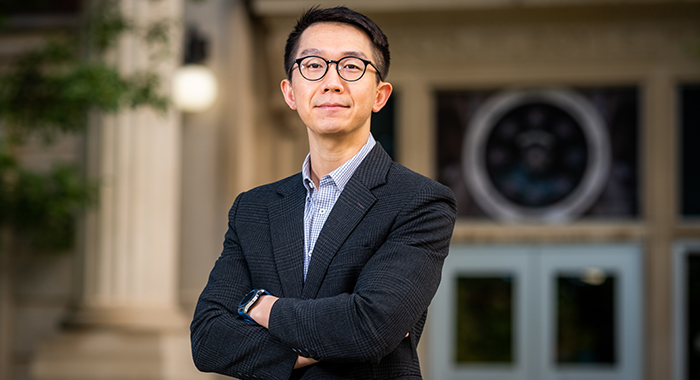A Historian of Migration Makes His Move to St. Norbert
Anh Sy Huy Le (History) has joined the St. Norbert faculty after eight-plus years of scholarship and teaching in the areas of Southeast Asian histories. A historian in modern Vietnam and its relationship to China, he arrives with great ambitions for his students and his research to uncover and analyze the histories of the economically dynamic region.
Born in Hanoi, Vietnam, Le started his scholarly career in America's heartland as an undergrad at Wabash College in Indiana. His studies in migration histories are inspired by personal experience: “I think it’s a reflection of my own life,” Le says. “As a migrant myself, my life has always been on the move. So, I moved as a young kid to the U.S. to pursue education and so I find that mobility, the impact of mobility of one’s life interesting. … You cannot talk about one’s history without talking about the history of movement, their families, their ancestors and so forth.”
Coming to St. Norbert feels like coming home
Le’s academic journey took him from Wabash, where he majored in economics, to graduate school in Buffalo, N.Y., and then to the Michigan State University where he studied under the tutelage of Dr. Charles Patrick Keith, an expert of Vietnamese history – and a historian of Vietnamese Catholicism. Fellowships followed with the SSRC-Andrew Mellon Foundation, The American Council of Learned Societies and the Lee Kong Chian Fellowship from the National Library of Singapore.
While in Singapore on the Singaporean government funded fellowship, Le found himself on full pandemic-fueled lockdown. He says, “I think the best way to capture an experience is to live through it. I lived through the pandemic. … I feel like I’m just a living history of some sort.”
Holed up in his hotel room with a suitcase full of priceless books and documents borrowed from the shuttered library, he interviewed for an open position teaching Asian history at St. Norbert College. Amazed at the welcoming and kind nature of the interview committee, Le couldn’t resist returning to the Midwest. “Eventually I came back home, which is the Midwest. I have a very special fondness for the Midwest, very friendly people … my familiar terrains.”
When he stepped off the plane, he felt that friendliness almost immediately: “Bob Kramer in the history department picked me up at 11 p.m. at the airport and we went for late night burgers. … At that time, I hadn’t been back to the U.S. for about two years, so that was an extremely heartfelt moment for me to be welcomed back.”
Migration and its histories make up who we are
Le says, “As I travel and do research, the impacts of migration on the development of any societies ... it has been an indispensable component of societal developments that sometimes we tend to forget.”
With his economics background, he is especially interested in how migration – and specifically Chinese migration – transformed, and transforms, Southeast Asia. “I try to trace the movement of really wealthy people to track these Chinese migrants across the landscape in Southeast Asia, and I study their influence on societies there, on the making of the cities, metropolitan cities in Asia,” he says.
A recently published article by Le, from his research in Singapore, centered on how rice, the commodity, transformed Vietnamese colonial cities. He says, “It’s something quite unexpected because people don’t think about rice as something transformative. It’s something we eat. … but in order to have rice you have to have mass production, you need labor, so who are you going to hire? … It’s really a capitalist system, an enterprise, and who in Vietnam is running this enterprise? It’s Chinese merchants, Chinese migrants.”
Le has also published work in the Journal of Migration Studies and in China & Asia: A Journal in Historical Studies.
The historian hopes his students look beyond names and numbers to understand the importance of narratives and personal stories. It’s the experiences and the perspectives that matter most. “The complexities of humanities that you cannot generalize is something that has unfortunately been lost in the current political climate. Anything I can do to show them that it’s important to be human and to value people’s experiences and stories. History can provide very powerful tools for students,” he says.
Southeast Asia and the future
Le sees great interest from his students in the areas of Southeast Asian history. He believes it’s an important subject for many to understand as the region is experiencing tremendous economic growth. “It’s a fascinating place; it’s a place that St. Norbert students should know about because in 10 years it will become the next global epicenter of economic developments,” he says.
The next year will be spent focusing on teaching – courses include Introduction to Modern East Asia and The Vietnam & American Wars, 1900-present – and immersing himself in the college community; he hopes to become more involved with SNC’s international programs. In the spring he will join a panel on Chinese migration with other experts, and he will revisit his Ph.D. dissertation, a comprehensive history of Chinese migration in French Colonial Vietnam, in hopes of publishing it in book format.
He also has ambitions of translating several Vietnamese texts concerning capitalism in Vietnam. Le says, “I want to translate these so they can function inside a classroom as a primary source from Vietnam so students can have access to the voices of people there. Not many have been translated from the Vietnamese language.” He hopes one day they will be used in his own courses at St. Norbert.
Nov. 16, 2021












